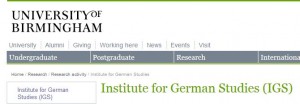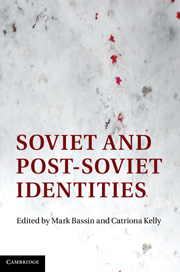 The GDR today
The GDR today
University of Birmingham, United Kingdom
January 10, 2014
Deadline for submitting abstracts: November 8, 2013
The University of Birmingham invites papers for a 1-day postgraduate colloquium focusing on the history and memory of GDR politics, culture and society. The event will be held at the University of Birmingham on 10 January 2014 and is sponsored by the Institute for German Studies and the Graduate Centre for Europe. Prof. Helmut Peitsch (Universität Potsdam) and Prof. Dennis Tate (University of Bath) will act as discussants for the student presentations, alongside the organisers Dr Sara Jones and Dr Joanne Sayner (University of Birmingham), Dr Debbie Pinfold (University of Bristol) and Dr Anna Saunders (Bangor University).
When Stefan Heym claimed, in 1990, that the GDR would become nothing more than a ‘footnote in world history’, few could have anticipated the importance of its legacy in shaping the cultural, social and political spheres of the united Germany. The opening of previously inaccessible archives resulted in an upsurge in historical analyses of the East German state and thereby new insights into its politics, culture and society. However, the availability of new material did not result in historical consensus about the nature of the socialist system. The revival of totalitarian theory, with its focus on the instruments of repression and control, was challenged by models that sought to understand GDR society from the inside, as a ‘participatory dictatorship’ (Fulbrook), in which individuals negotiated a ‘normal life’ within the boundaries of the regime. The debates surrounding the GDR from the perspective of history are rivalled by the contentious nature of its representation in memory. The 1990s saw the controversial trials of those implicated in the old regime and the often shocking revelations of Stasi files. These may now have given way to more varied accounts of state socialism; however, this part of the German and European past remains fiercely contested, as different mnemonic communities vie to have a voice in the debate and to determine the image of the GDR that will remain in collective memory.
In recent years the spate of round anniversaries – 20 years of the ‘fall’ of the Wall, 50 years of the building of the Wall and 60 years of the 1953 uprisings – has given unprecedented prominence to GDR history in contemporary Germany. 2014 represents yet another anniversary, as we mark twenty-five years since the end of state socialist rule in Central and Eastern Europe. In this context, the Universities of Birmingham, Bangor and Bristol will host a one-day postgraduate symposium, in which we will take stock of scholarship on the GDR today, as well as identify areas for future research. The event will bring together postgraduates working on the history, memory and culture of the GDR with the aim of examining not only what the GDR was, but how its memory continues to influence attitudes and policies today. The intention is to provide a productive forum for the exchange of ideas in the presence of established experts in the field.
Eligible topics for the conference
Questions that we might consider include, but are not limited to:
How do scholars of history understand the state socialist system 25 years after transition?
What can analysis of particular aspects of GDR history or culture contribute to an understanding of the whole?
What is the relationship between the history and/or culture of the GDR and its representation in memory?
What patterns can be identified in the memory debates of the last twenty-five years?
Is there a discernible shift from communicative to cultural memory? Are these even the right terms for understanding memory in the twenty-first century?
To what extent has our understanding of concepts such as victimhood and perpetration become modified over
Why have different memory media proven to be particularly productive at different points in time, and to what effect?
We invite proposals for papers of no more than 10 minutes examining any area of the history, memory or culture of the GDR, including film, literature, museums, politics and the built environment. Students may choose to present an overview of their thesis as a whole, or an aspect of it on which they would particularly like feedback.
Guidelines for submission
Abstracts of no more than 150 words should be submitted to Dr Sara Jones at s.jones.1@bham.ac.uk by the 8 November 2013.
Funding is available for eighteen students to attend the colloquium, including travel within the UK and lunch/refreshments throughout the day. Depending on the level of interest, we may be able to pay towards travel costs from Germany but are unlikely to be able to fund the whole amount.Places will be allocated on a competitive basis.
For further information, please contact one of the organisers: Dr Sara Jones (s.jones.1@bham.ac.uk), Dr Joanne Sayner (j.sayner@bham.ac.uk), Dr Debbie Pinfold (Debbie.Pinfold@bham.ac.uk) or Dr Anna Saunders (a.saunders@bangor.ac.uk).
Organizer
Institute for German Studies & Graduate Centre for Europe – University of Birmingham
Information & contacts
Mr. David J. Zell
University of Birmingham
United Kingdom
tel.: +44(0) 7702 506 406
e-mail: DJZ320@bham.ac.uk













